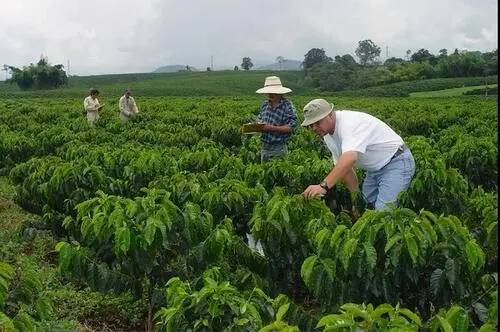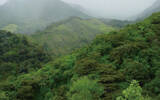Brazil's coffee exports have been strong in the past two months, but the weather and dengue fever have affected the future production season and coffee sales
Recently, according to Nasdaq, the price of Arabica fell and Robusta rose slightly in the early days due to the recovery of production and exports from many coffee producing countries around the world. But the prices of both coffee beans have risen recently, mainly due to shortages caused by the recent drought in Brazil and the reluctance of farmers to trade coffee beans because of dengue fever.
Brazil's recent rainfall has been below average. According to Brazilian meteorological company Somar Meteorologia, the Brazilian state of Minas Gerais accounts for 30% of Brazil's Arabica coffee crop production, but the rainfall in the past period was 6.6mm, only 16% of the historical average, which will still affect future production and coffee sales.

Although, earlier, Brazil has sold 84% of the coffee production in 2023, compared with the same period last year, the progress is the same as the same period last year, of which the sales progress of Arabica is 80%. Although the market is active, it is still lower than the sales progress of 81% in the same period last year. Robusta's sales progress was 91%, up from 88% in the same period last year, as production of Robusta coffee in Vietnam and Indonesia was reduced, and geopolitical problems in the Red Sea affected Eurasian routes. traders reduced their purchases of Robusta in Vietnam and Indonesia and switched to buying Brazilian Robusta beans. It is also due to the increase in global demand for coffee, especially in China, where Brazilian coffee bean exports to China increased by 158.5% in January and February 2024 compared with the same period last year.
But Brazil's coffee pre-sale in 2024ache 25 has been slow, with only 11 per cent of the expected output presold, well below 25 per cent in the same period last year. This is mainly due to the rise in international prices and the increase in demand. Some traders feel that the price is too high, especially the price of Robusta coffee, which leads to more cautious purchases.

In addition, the meteorological department predicts that La Nina weather may also lead to low pre-sales of Brazilian coffee in the second half of the year. And the National Weather Service said the probability of La Nina weather in the second half of the year rose from 60% to 62%. The return of La Nina phenomenon may lead to less rainfall and colder weather in southeastern Brazil and an increase in rainfall and humidity in the northeast. The cold weather will cause a sharp drop in temperature in coffee-producing areas, which will bring frost disasters and damage coffee production in the current season and future seasons.
In addition, the recent problem of dengue fever in Brazil is serious. According to data from the arbovirus surveillance team of the Brazilian Ministry of Health, so far, the number of cases and suspected cases of dengue fever in Brazil has exceeded 1.8 million, the highest on record. Symptoms include persistent fever, headache, muscle pain, joint pain, etc., which can cause death in severe cases. At present, 561 people have been confirmed to have died from dengue fever, and another 1020 deaths are under investigation. The head of the Health Supervision Office of the Ministry of Health said earlier that the number of confirmed and suspected cases of dengue fever in Brazil is expected to reach 4.2 million this year.
Due to the sharp rise in dengue cases, eight states and federal districts across Brazil have declared a state of health emergency, including several major coffee producing areas in Brazil, such as Sao Paulo, Minas Gerais and Esp í rito Santo. Experts point out that hot and rainy weather caused mainly by El Ni ñ o and climate change have created conditions for the breeding of Aedes aegypti mosquitoes, which are the main vectors of dengue fever. As a result, industry insiders say that the new coffee season is approaching in April, but the current dengue fever may lead to a reduction in the labor force, although some are harvested mechanically, but some boutique Arabica producing areas and estates may have a serious impact.
Brazil may face economic losses of more than 20 billion Brazilian reais (US $4 billion) in 2024 due to the rapid increase in the number of people infected with dengue fever, according to a new report by the Federation of Industries of the Brazilian state of Minas Gerais. Among them, the medical cost of dealing with dengue fever in Brazil will exceed 5 billion, and the loss of industrial production may reach 15 billion. These conditions make farmers in no hurry to sell their coffee beans, hoping to wait and see the future trend before selling coffee, and to ensure that their stocks can be sold even if their production is affected.
Important Notice :
前街咖啡 FrontStreet Coffee has moved to new addredd:
FrontStreet Coffee Address: 315,Donghua East Road,GuangZhou
Tel:020 38364473
- Prev

Panamanian Coffee beans | introduction of Coffee beans in Bokui Special area
Panamanian coffee is well-known in the global coffee market, especially the rose summer variety. In 2005, the rose summer planted by the Emerald Manor won the best Panama BOP competition and was famous in the coffee industry for its high auction price. Panama Coffee Panama is located in Central America, bordering Colombia and Costa Rica.
- Next

It's too abstract! McDonald's set up clocking in for eight people in the morning!
▲ Click to follow | Daily boutique Coffee Culture Magazine Coffee Workshop A few days ago, when some Beijing netizens took the subway, they found that McDonald's had set up an exclusive sign-in point for "early eight people" at Chaoyangmen Station on Line 6. The abstract painting style not only "woke up" every passing office worker, but also made many sleepy contestants think they made a mistake.
Related
- What grade does Jamaica Blue Mountain No. 1 coffee belong to and how to drink it better? What is the highest grade of Blue Mountain coffee for coffee aristocrats?
- What are the flavor characteristics of the world-famous coffee Blue Mountain No. 1 Golden Mantelin? What are the characteristics of deep-roasted bitter coffee?
- Can I make coffee a second time in an Italian hand-brewed mocha pot? Why can't coffee be brewed several times like tea leaves?
- Hand-brewed coffee flows with a knife and a tornado. How to brew it? What is the proportion of grinding water and water temperature divided into?
- What is the difference between Indonesian Sumatra Mantinin coffee and gold Mantinin? How to distinguish between real and fake golden Mantelin coffee?
- What does bypass mean in coffee? Why can hand-brewed coffee and water make it better?
- Unexpected! Ruixing Telunsu lattes use a smoothie machine to foam milk?!
- % Arabia's first store in Henan opens into the village?! Netizen: Thought it was P's
- Does an authentic standard mocha coffee recipe use chocolate sauce or powder? Mocha Latte/Dirty Coffee/Salty Mocha Coffee Recipe Share!
- What is the difference between Vietnam egg coffee and Norway egg coffee? Hand-brewed single product coffee filter paper filter cloth filter flat solution!

